How does artificial intelligence benefit sales enablement?
Let’s start by taking an honest look at the department in question.
Sales enablement is a famously under-resourced and overtaxed department. Sales enablement managers are generally responsible for onboarding and training sellers, implementing sales methodologies, creating and managing sales content alongside marketing, and planning sales kickoff events. Not to mention they’re teams of one or two overseeing sales forces at least 50 times their own size.
And sales enablement departments have proven they can do world of good when given the right tools. That’s why sales enablement platforms exist in the first place — and why artificial intelligence has already become a staple of those platforms.
Here are a few ways artificial intelligence benefits sales enablement, adjacent go-to-market roles, and the organizations they work for.
What is the primary use of artificial intelligence in sales enablement?
For departments like sales enablement with too much on their plate, the primary benefit of artificial intelligence is automation.
But building an “AI-powered” go-to-market organization doesn’t mean replacing sellers and content creators with robots. Instead, it eliminates repetitive tasks and lets us focus on our more human strengths, like creativity, strategy, and empathy. You know, the things that matter most to customers and help define your brand.
And despite the media frenzy surrounding AI thanks to ChatGPT, we’ve long used AI to improve and support sales, enablement, and marketing professionals throughout every phase of the sales lifecycle. Tools like automated content provisioning and intelligent recommendations are key examples.
Sales enablement and marketing teams benefit from the support AI provides sellers as well as trackable engagement metrics that give them ability to prove the ROI of their daily efforts.
Sales teams benefit from quick, easy access to relevant sales collateral and content summaries, helping them achieve higher win rates and deliver better experiences to prospects.
For each of these teams, AI is the backbone of a more efficient workflow. In fact, researchers found that AI-powered sales and marketing teams were able to generate 50% more leads and reduce call times by up to 70%.
How can AI help sales enablement teams deliver better outcomes?
Sales enablement teams aren’t just busy, they’re also under a lot of pressure. Like sales and marketing managers, they’re often upheld to several success KPIs — think quarterly quotas, key account growth, marketing ROI, and opportunities in progress.
All of these metrics are linked to even more daily tasks, including:
- program execution
- lead qualification
- follow-up calls
- sales support
- content creation
- communications
- training
- coaching
- cold-calling
- appointment setting
- meetings
It’s a lot to do and a lot of responsibility. So these teams need any leg up they can get to be more efficient and productive. Especially in the days of “do more with less.”
But let’s take a look at what AI brings to the table beyond the usual set of buzzwords.
Below are four key ways the use of artificial intelligence benefits sales enablement, their partners in sales and marketing, the customer, and therefore, the company.
1. Use of artificial intelligence in sales enablement content
We all know the critical role that content plays in generating leads, educating prospects, and closing deals. However, many teams still struggle to address the gap between content creators and the sales teams that rely on those materials to move buyers through the sales cycle.
When surveyed, 65% of salespeople say they can’t find sales collateral when they need it. That’s a lot of wasted time and money, considering your marketing and enablement teams have to put together all of these unused resources.
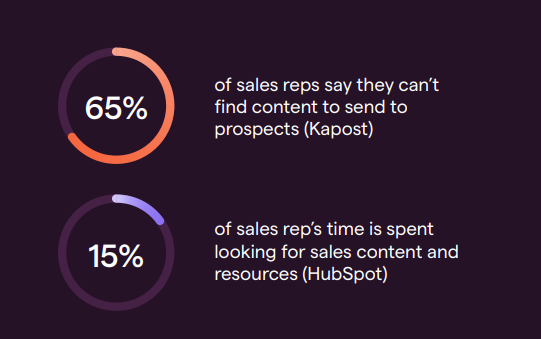
What if, instead, sales content was recommended to your reps based on their prospect’s industry or how well that piece of content performed for other reps in similar situations? What if sales content automatically appeared in your reps’ CRM dashboard for a particular prospect or customer? What if reps were given content summaries as well as relevant assets when searching in your content management system?
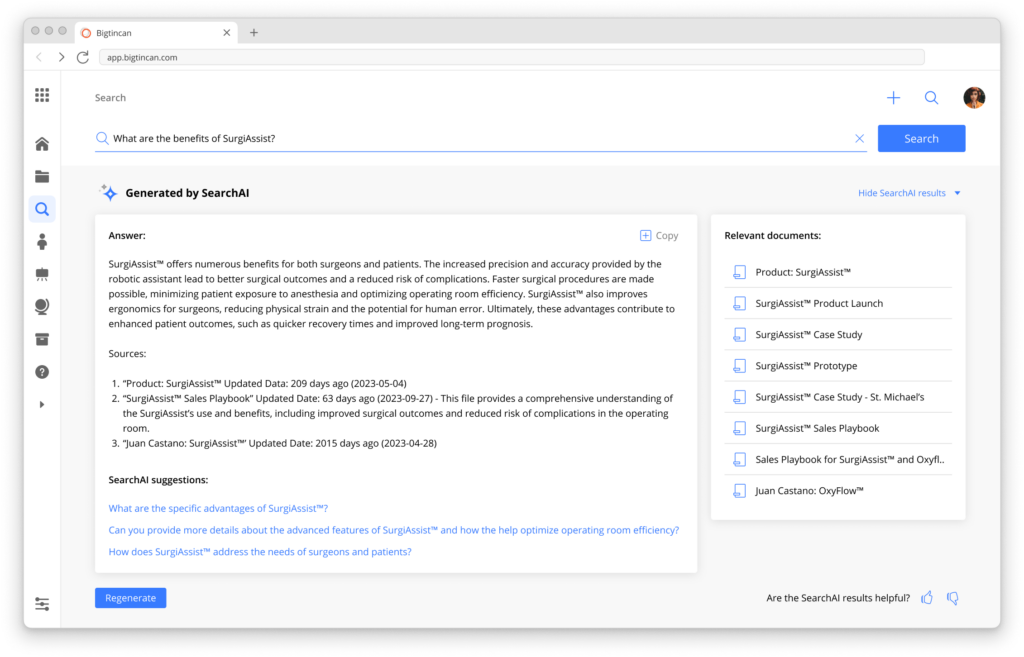
AI-powered sales enablement software can seamlessly integrate into CRM systems, marketing automation platforms, and other business tools, giving reps the content they need to better serve every opportunity in their pipeline. And with AI-powered search and summaries, they don’t have to read through every piece of content to find the answer they’re looking for.
AI also helps sellers create content in addition to simply finding it. Generative AI provides a head start in the creation of sales scripts and emails, especially when used as part of an internal system as opposed to open-source tools like GPT.
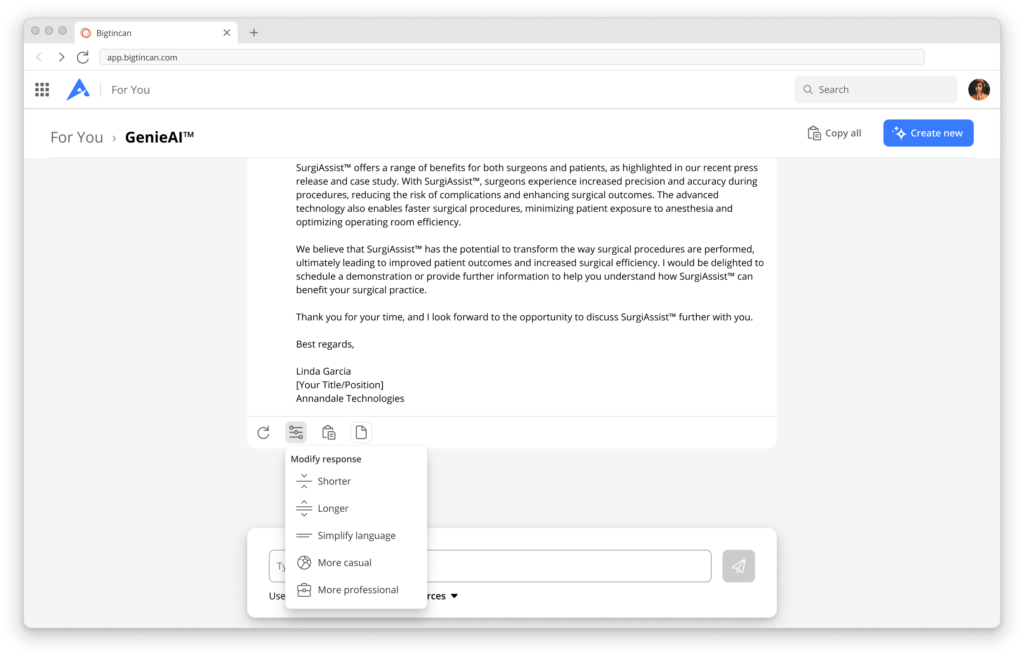
It’s small improvements like these that save reps huge amounts of time. Letting AI take on these supportive tasks also removes them from the already overloaded plates of enablement and marketing.
2. Using AI in learning, training, and onboarding
It’s not just customer-facing activities that benefit. AI is making training and onboarding faster and more efficient, too.
Coaching AI supports busy sales and enablement teams by providing on-demand pitch practice and objective feedback to sales reps. The AI scores sellers’ submissions on pacing, clarity, tone of voice, and even their “vibe” — all without the requirement of a sales or enablement manager.
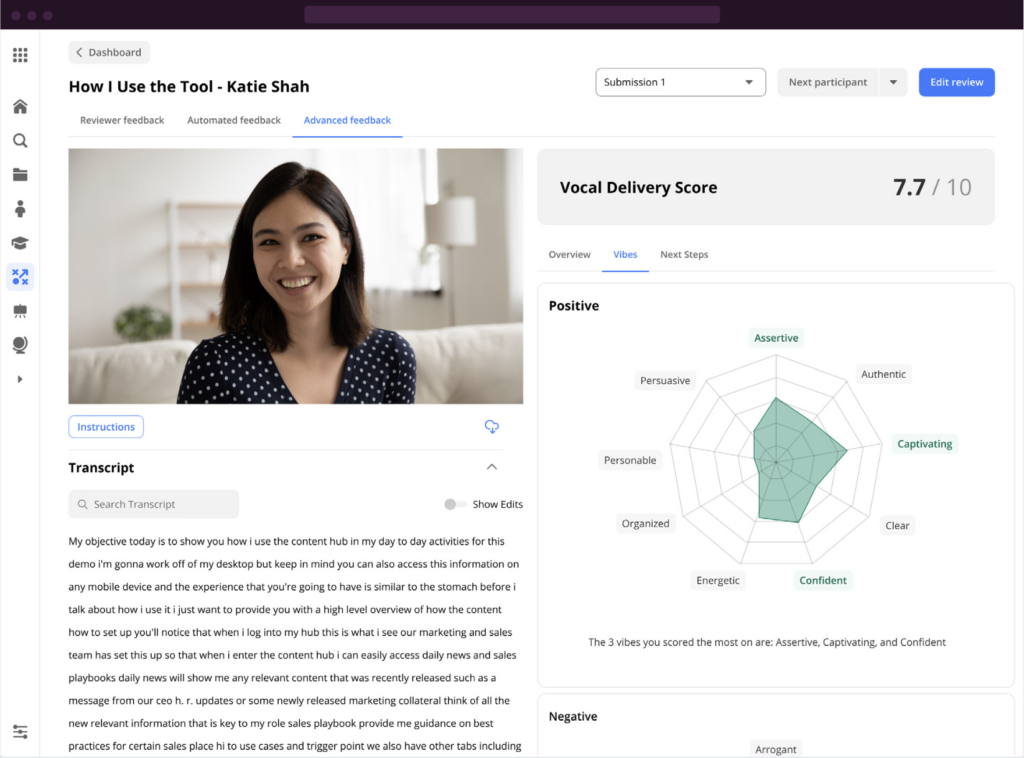
See also: What vibes help you sell? How AI-powered sales coaching improves your pitch.
AuthoringAI helps in the creation and maintenance of training and onboarding materials. It lets sales enablement managers generate voiceover, slide notes, and captions for training videos, translate those videos, and even clone their own voice after providing a small sample so training content is consistent.
In these cases, AI steps in to supplement small teams by taking over time-consuming but important tasks.
3. AI offers better collaboration and communication
Helping sales reps develop improved selling techniques and higher quota attainment isn’t just about formal training and access to content — it’s about great communication. Working with and learning from colleagues can help spread critical knowledge across your team quickly and efficiently.
And, rather than being the personnel-replacing boogieman that workers have come to fear, AI is being used to drive collaboration between real people. AI-infused sales enablement platforms can recommend peers to follow or collaborate with for better results.
One of the best examples of AI-driven collaborative selling is account-based marketing (ABM).
Most B2B companies have this idea of a target account list as being this valuable thing that requires special attention and care to sustain over time. But with machine-learning systems like AI that learn from past wins and losses, as well as content usage analytics, marketing and sales can get together to develop account-specific strategies based on what really works.
And, ultimately, employees who have more time and resources are less stressed and work better together. That may be the biggest boon of them all.
4. Using AI for sales kickoffs
Putting together the annual sales kickoff (SKO) event is perhaps the most intensive part of sales enablement’s job. From planning, to execution, and all the way through follow-up, AI tools can help alleviate some of the many, many tasks involved in pulling off an impactful SKO.
Enablement practitioners can turn to Generative AI for help with planning.
You can just type in ‘create a project plan for a sales kickoff for a small tech company that’s an in-person event for a hundred people’ and it will give you a full project plan.
– Bigtincan Senior Sales Enablement Manager Jared Hibbs
If you have never planned a SKO before, AI can provide a great starting point, or at the very least, some inspiration for your own event.
And if you’re newly implementing AI throughout your sales organization, what better place to train sellers on it than your SKO? Add some AI activities to your itinerary like coaching challenges using AI feedback, roleplays where AI takes the place of the customer (shown below), and even AI content editing workshops.
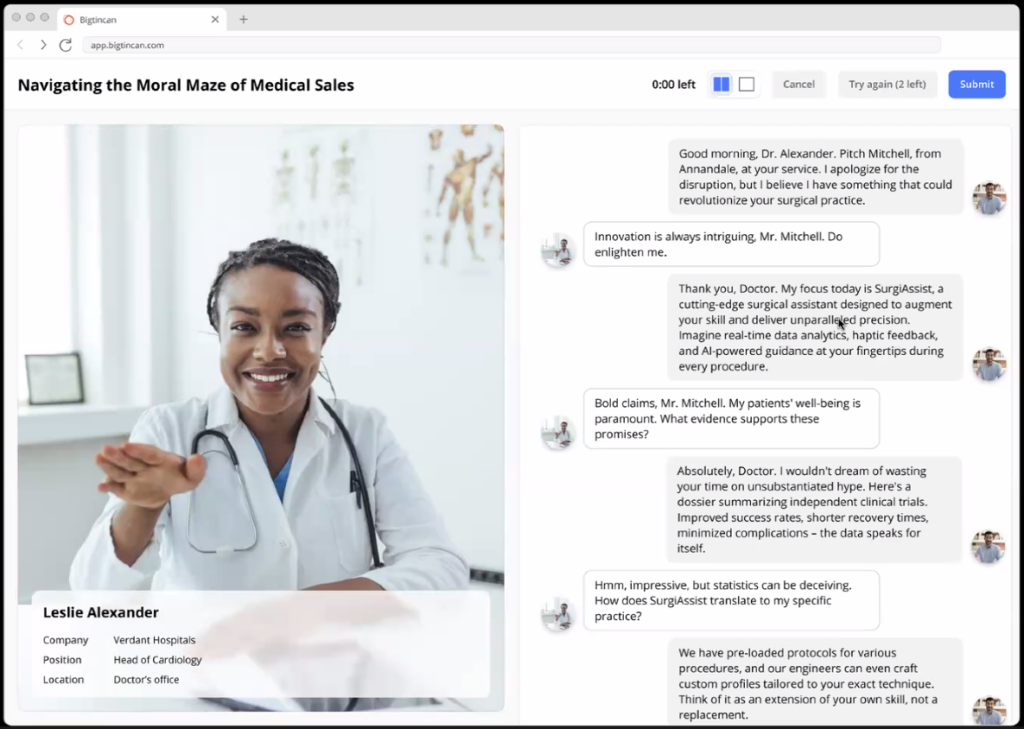
See how to use AI in conjunction with other sales enablement tools for SKO.
Takeaways
- Improving enablement and go-to-market performance through AI isn’t just wishful thinking. It’s a reality for teams working across all sectors from retail and manufacturing to life sciences and tech companies.
- By combining machine-learning-based algorithms with pattern-matching and usage analytics to track and measure performance, engagement, and more, savvy teams can turn data into a recipe for success.
- AI supplements small enablement teams to give them back time and resources they’re usually lacking in order to perform at their best.
- Recommended content and actions can help successful reps the right sales collateral at the right time, guiding a junior salesperson based on the success of more senior reps in the company.
